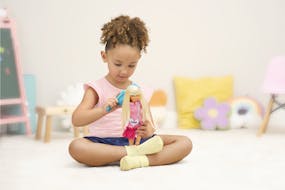Before they're two months old, your baby will be offered a medical once-over or general review. Find out what to expect at your baby's 6-8 week check-up, plus practical ways to prepare for your appointment.
This page contains affiliate links, which means we may earn a small amount of money if a reader clicks through and makes a purchase. All our articles and reviews are written independently by the Netmums editorial team.
Although the vast majority of babies will be absolutely fine, the six-to-eight-week check is a vital chance to pick up a number of potential health problems that could benefit from early treatment.
It will usually be carried out at your local doctor's surgery or clinic, or at home, by a trained professional such as a GP, nurse, or health visitor.
You'll be able to stay with your baby throughout the check. It won't cause them any pain although they may find the manipulation of their legs to check for hip problems a little uncomfortable. And they may also protest about having to undergo parts of it naked!
FREE NEWBORN NAPPIES
Don't forget to take your baby's child health record, usually better known as the red book, when you go as all the results will be recorded in it.
You don't have to wait for any results – you'll be told immediately if everything is OK, or if there's something that might need further investigation.
What happens at the six-to-eight-week check?
During the appointment, you'll be asked questions and your baby will be examined to find out whether they're developing, feeding, and gaining weight, and that their hearing and vision seem OK. Four further specific areas of your baby's health will be looked at:
- Eyes: The appearance and movement of your baby's eyes will be checked for a handful of rare abnormalities, including cataracts, using an ophthalmoscope. Only two or three babies in 10,000 have an eye problem that requires treatment: if one is picked up in your baby, you'll be referred to an eye specialist (an ophthalmologist).
- Heart: A simple check for congenital heart disease is carried out by listening to your baby's heartbeat with a stethoscope. If a heart murmur is picked up, it's not necessarily anything to worry about, as these are common and in most cases harmless. Around one in 200 babies are found to have a heart problem that requires treatment. Further tests will be arranged if anything out of the ordinary is found.
- Hips: Your babies legs will be gently manipulated so that their hips can be checked for a condition called developmental dysplasia of the hip (DDH). If anything seems wrong (or if your baby has a risk factor for this condition, for instance where there's a family history), further investigation using ultrasound may be needed. About one or two in 1,000 babies have hip problems that require treatment.
- Testes (if you have a boy!) : Your son's testes will be checked to make sure both have descended into the scrotum. If not, your health visitor or doctor will want to check again in the future. Most drop by themselves by the age of one, but if they don't, minor surgery may be needed later. About one in a hundred boys have a problem with their testes that requires treatment.
The healthcare professional will also record your baby's weight and length , plus the circumference of their head . These can all be plotted against the growth charts in your red book to make sure your baby is growing well.
They should discuss your baby's vaccinations, too. The first round of jabs is due at about eight weeks, so they'll explain why they're necessary and what to expect. You can learn more by reading up on your baby's first vaccinations .
Ways to prepare for your baby's six to eight week check
In the days and weeks before the appointment, keep a note of anything that's worrying you about your baby .
This could be issues around breastfeeding or bottle-feeding , concerns about their poo , struggles with sleep ... Anything at all that's concerning you.
It's very easy to forget everything when you're actually in the surgery. Keeping a list on your phone or a notepad will help to make sure you get answers to all your questions on the day.
Don't let them rush you . We all know that GPs and other healthcare professionals are very busy, but this is your time to ask about anything that's worrying you. If you fail to mention something now, you may need to book another appointment in future, taking up more of everyone's time. So stand your ground and be sure to ask about anything that's concerning you.
Never worry about being judged. The person doing the check will be a trained professional, who'll have seen it all before. There's no such thing as a silly question, and you should never be judged for anything you say.
It's also a good idea to find childcare for older kids. It may be tempting to take them into the appointment, but you'll need to give it your full attention.
Will I get a postnatal check, too?
All pregnant women should be offered a postnatal check around six-to-eight weeks after the baby's birth.
This may happen immediately before or after your baby's check, or you may want to book it in at a separate time.
Your doctor or other healthcare professional should check that you're recovering OK from the birth (which can include a physical examination if you want), plus check on your mental health and talk about contraception options.
Your postnatal check is a great opportunity to speak up if there's anything at all that's bothering you. It's particularly important to say if you're feeling overly anxious, weepy, panicky, or are just not coping well, as these are all possible signs of postnatal depression .
But of course, if you have any pressing worries about how you're healing from the birth, or your mental wellbeing, you can mention it to your GP or health visitor at any time.
Your Baby Week by Week by Simone Cave is the ultimate guide to caring for your new baby, with tips on what to expect as they develop and grow. See more details here at Amazon.
Looking for ideas for nursery deco? We love this beautiful wooden name sign that's available in lots of different colours and is made individually to order. Perfect for displaying on a shelf or on the wall by your baby's cot or crib. See more details here at Etsy.
Need advice?
Our health visitors and nursery nurses are online Monday to Friday evenings to answer your queries on feeding, sleep and child health.
Learn more about early tests and checks for your baby, or chat to other parents in our forum:
Related stories
Learn what checks your newborn baby should be offered







